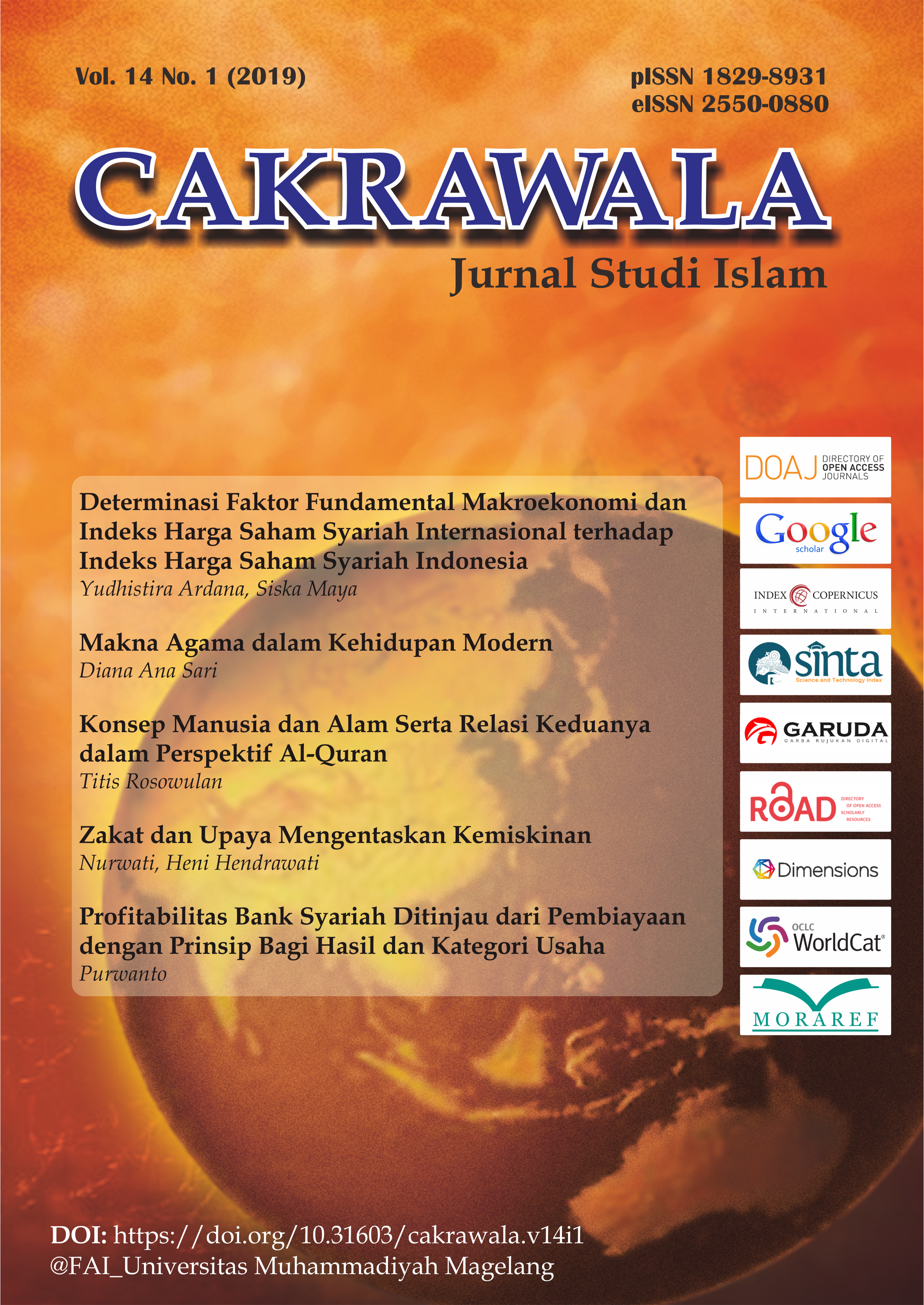Main Article Content
Abstract
Humans as creatures of God, have their own characteristics and uniqueness compared to other creatures, which makes it as a Caliph in the earth. To manifest the meaning of the Caliph, humans need a means in the form of the universe with all its contents. This article seeks to dig deeper into human and natural concepts and their relations in the perspective of the Koran. In discussing this problem, the author will use a qualitative descriptive method by exploring the verses of the Koran that speak of this theme based on the theory of relations. From this study, it can be concluded that the relationship between humans and nature is not always affirmative, sometimes negative. However, to minimize the damage to nature, this negative relationship needs to be eroded, and if it has to happen, it needs to be comprehensively studied so that efforts to improve the welfare of the universe do not have bad excesses which have a great deal of damage
Keywords
Article Details

This work is licensed under a Creative Commons Attribution-NonCommercial 4.0 International License.
References
- Arikunto, S. (2014). Prosedur Penelitian Suatu Pendekatan Praktik. Jakarta: Rineka Cipta.
- Bucaille, M. (1979). Bibel Quran dan Sains Modern. Jakarta: Bulan Bintang.
- Burhanuddin, N. (2016). Ilmu Kalam, Dari Tauhid Menuju Keadilan: Ilmu Kalam Tematik, Klasik, dan Kontemporer. Jakarta : Prenada Media Group.
- Dewi, S. (2015). Ekofenomenologi: Mengurai Disekuilibrium Relasi Manusia dengan Alam. Jakarta: Marjin Kiri.
- Hamka. (2007). Tafsir al-Azhar: Juz 2. Jakarta: Pustaka Panjimas.
- Izutsu, T. (1997). Relasi Tuhan dan Manusia: Pendekatan Semantik terhadap al-Quran. Yogyakarta: Tiara Wacana.
- Kartanegara, M. (2007). Nalar Religius: Menyelami Hakikat Tuhan, Alam dan Manusia. Jakarta: Erlangga.
- Masruri, U.N. (2014). Pelestarian Lingkungan dalam Perspektif Sunnah. At-Taqaddum: Jurnal Peningkatan Mutu Keilmuan dan Kependidikan Islam. 6(2), 411-428.
- Muthahhari, M. (2002). Manusia dan Alam Semesta: Konsepsi Islam tentang Jagat Raya. Jakarta: Lentera Basritama.
- Purwanto. (2018). Teknik Penyusunan Instrumen Uji Validitas dan Reliabilitas Penelitian Ekonomi Syariah. Magelang: StaiaPress.
- Rahman, F. (2017). Tema-tema Pokok al-Quran. Bandung: Mizan.
- Raja, M.U.A. (2018). Manusia dalam Disekuilibrium Alam: Kritik atas Ekofenomenologi Saras Dewi. Balairung: Jurnal Multidisipliner Mahasiswa Indonesia. 1(1), 42-57.
- Rosowulan, T. (2015). Aspek-aspek Humanis Pemikiran Keagamaan Hamka. Hikmatuna: Journal for Integrative Islamic Studies, 1(2), 1-30.
- Sahidah, A. (2018). God, Men and Nature: Perspektif Toshihiko Izutsu tentang Relasi Tuhan, Manusia dan Alam dalam al-Quran. Yogyakarta: Irchisod.
- Sihotang, K. (2009). Filsafat Manusia: Upaya Membangkitkan Humanisme. Yogyakarta: Kanisius.
- Syati’, A.B. (1999). Manusia dalam Perspektif al-Quran. Jakarta: Pustaka Firdaus.
- Zar, S. (1997). Konsep Penciptaan Alam dalam Pemikiran Islam, Sains dan al-Quran. Jakarta: Raja Grafindo Persada.

